- Clone
- DX27 (See other available formats)
- Regulatory Status
- RUO
- Other Names
- CD158b1 (KIR2DL2, p58.2), CD158b2 (KIR2DL3, p58.3), CD158j (KIR2DS2, p50.2), KIR-NKAT2
- Isotype
- Mouse IgG2a, κ
- Ave. Rating
- Submit a Review
- Product Citations
- publications
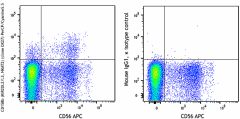
-

Human peripheral blood lymphocytes were stained with CD56 APC and CD158b (KIR2DL2/L3, NKAT2)(clone DX27) PerCP/Cyanine5.5 (left) or Mouse IgG1, κ PerCP/Cyanine5.5 isotype control (right)
| Cat # | Size | Price | Quantity Check Availability | Save | ||
|---|---|---|---|---|---|---|
| 312613 | 25 tests | 141€ | ||||
| 312614 | 100 tests | 306€ | ||||
CD158b is expressed on natural killer cells and a subset of T cells. It is a member of the immunoglobulin superfamily containing two immunoglobulin C2-type domains. Both variants and alternative isoforms of CD158b have been reported. The interaction of CD158b with specific HLA-C antigens on a target cell (HLA-Cw1, HLA-Cw3, HLA-Cw7 alleles, for example) inhibits cytotoxicity and prevents target cell lysis and death. The interactions between KIR and MHC class I are thought to be important in NK cell and T cell regulation following antigen stimulation. The absence of ligands for KIRs may lower the threshold for activation through activating receptors and increase inflammation and susceptibility to autoimmune disease.
Product DetailsProduct Details
- Verified Reactivity
- Human
- Antibody Type
- Monoclonal
- Host Species
- Mouse
- Formulation
- Phosphate-buffered solution, pH 7.2, containing 0.09% sodium azide and BSA (origin USA)
- Preparation
- The antibody was purified by affinity chromatography and conjugated with PerCP/Cyanine5.5 under optimal conditions.
- Concentration
- Lot-specific (to obtain lot-specific concentration and expiration, please enter the lot number in our Certificate of Analysis online tool.)
- Storage & Handling
- The antibody solution should be stored undiluted between 2°C and 8°C, and protected from prolonged exposure to light. Do not freeze.
- Application
-
FC - Quality tested
- Recommended Usage
-
Each lot of this antibody is quality control tested by immunofluorescent staining with flow cytometric analysis. For flow cytometric staining, the suggested use of this reagent is 5 µl per million cells in 100 µl staining volume or 5 µl per 100 µl of whole blood.
* PerCP/Cyanine5.5 has a maximum absorption of 482 nm and a maximum emission of 690 nm. - Excitation Laser
-
Blue Laser (488 nm)
- Application Notes
-
The DX27 monoclonal antibody reacts with a common epitope of KIR2DL2 (CD158b1, p58.2), KIR2DL3 (CD158b2, p58.3), and KIR2DS2 (CD158j, p50.2). Additional reported applications (for the relevant formats) include: restoring the NK cell cytotoxicity1,5.
This clone has been tested in-house and determined to not be suitable for applications in immunohistochemistry of paraffin-embedded tissue sections (IHC-P). -
Application References
(PubMed link indicates BioLegend citation) -
- Bakker ABH, et al. 1998. J. Immunol. 160:5239.
- Lucas M, et al. 2003. J. Virol. 77:2251.
- Goodier M, et al. 2000. J. Immunol. 165:139.
- Yawata M, et al. 2002. Immunogenetics 54:543.
- Valiante NM, et al. 1997. Immunity 7:739.
- Product Citations
-
- RRID
-
AB_2564334 (BioLegend Cat. No. 312613)
AB_2564334 (BioLegend Cat. No. 312614)
Antigen Details
- Structure
- Immunoglobulin superfamily member, contains two immunoglobulin C2-type domains, type I membrane protein
- Distribution
-
NK cells and a subset of T cells
- Function
- Inhibits cytotoxic function of NK and T cells upon interacting with specific HLA-C antigens on target cell
- Ligand/Receptor
- HLA-C antigens such as HLA-Cw1, HLA-Cw3, HLA-Cw7
- Cell Type
- NK cells, T cells
- Biology Area
- Immunology
- Molecular Family
- CD Molecules
- Antigen References
-
1. Colonna M, et al. 1995. Science 268:405.
2. Uhrburg M, et al. 1997. Immunity 7:753.
3. Wagtmann N, et al. 1995. Immunity 3:801.
4. Dohring C, et al. 1996. Immunogenetics 44:227.
5. Maenaka K, et al. 1999. Structure 7:391. - Gene ID
- 3803 View all products for this Gene ID
- Specificity (DOES NOT SHOW ON TDS):
- CD158b/j
- Specificity Alt (DOES NOT SHOW ON TDS):
- CD158b/j
- App Abbreviation (DOES NOT SHOW ON TDS):
- FC
- UniProt
- View information about CD158b/j on UniProt.org
Related Pages & Pathways
Pages
Related FAQs
- How stable is PerCP/Cyanine5.5 tandem as compared to PerCP alone?
-
PerCP/Cyanine5.5 is quite photostable and also better than PerCP alone in withstanding fixation.
Other Formats
View All CD158b/j Reagents Request Custom ConjugationCustomers Also Purchased
Compare Data Across All Formats
This data display is provided for general comparisons between formats.
Your actual data may vary due to variations in samples, target cells, instruments and their settings, staining conditions, and other factors.
If you need assistance with selecting the best format contact our expert technical support team.
-
Purified anti-human CD158b/j (KIR2DL2/L3/S2)
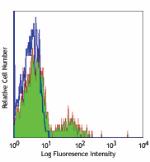
Human peripheral blood lymphocytes stained with purified DX2... -
FITC anti-human CD158b/j (KIR2DL2/L3/S2)
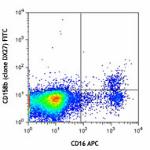
Human peripheral blood lymphocytes were stained with CD158b ... 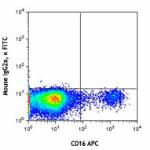
-
PE anti-human CD158b/j (KIR2DL2/L3/S2)
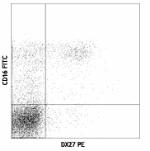
Human peripheral blood lymphocytes stained with DX27 PE and ... -
APC anti-human CD158b/j (KIR2DL2/L3/S2)
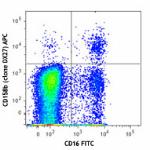
Human peripheral blood lymphocytes were stained with CD16 FI... 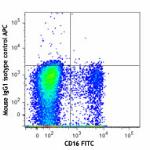
-
PE/Cyanine7 anti-human CD158b/j (KIR2DL2/L3/S2)

Human peripheral blood lymphocytes were stained with CD16 FI... -
PerCP/Cyanine5.5 anti-human CD158b/j (KIR2DL2/L3/S2)

Human peripheral blood lymphocytes were stained with CD56 AP... -
TotalSeq™-A0592 anti-human CD158b/j (KIR2DL2/L3/S2)
-
TotalSeq™-B0592 anti-human CD158b/j (KIR2DL2/L3/S2)
-
APC/Fire™ 750 anti-human CD158b/j (KIR2DL2/L3/S2)

LWB were stained with human CD158b (KIR2DL2/L3, NKAT2) (clon... -
TotalSeq™-C0592 anti-human CD158b/j (KIR2DL2/L3/S2)
-
Brilliant Violet 605™ anti-human CD158b/j (KIR2DL2/L3/S2)

Human peripheral blood lymphocytes were stained with anti-hu... -
TotalSeq™-D0592 anti-human CD158b/j (KIR2DL2/L3/S2) Antibody
 Login / Register
Login / Register 










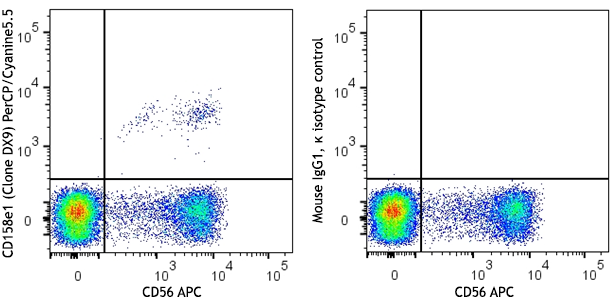
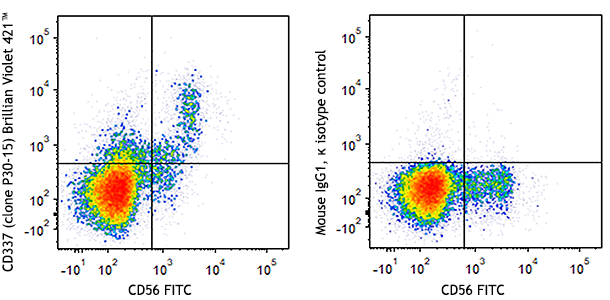
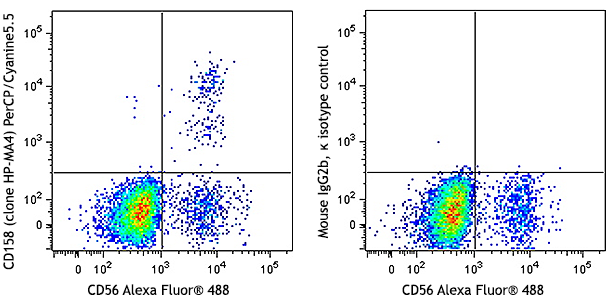
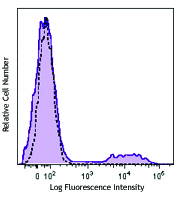



Follow Us